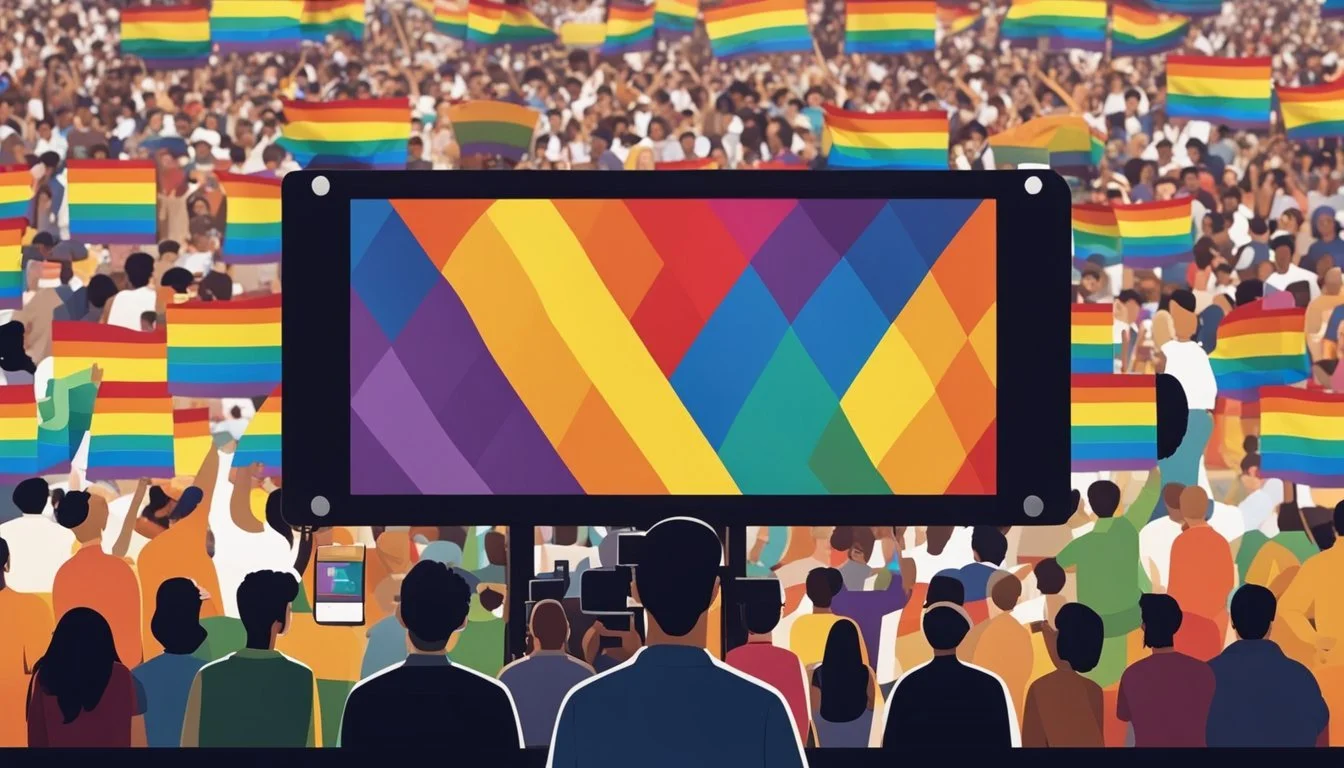Rob Epstein: Trailblazing LGBTQ+ Representation in Documentary Film Industry
Rob Epstein stands as a pioneering figure in the realm of documentary filmmaking, especially for his contributions to LGBTQ+ representation. Since the 1970s, Epstein has utilized his craft to shatter public silence around LGBTQ lives in America, delivering profound narratives that celebrate and humanize their experiences. His landmark work, "The Times of Harvey Milk," not only captured the life and legacy of a gay rights icon but also earned an Academy Award for Best Documentary Feature, cementing Epstein's status as a key voice in queer cinema.
Partnering with Jeffrey Friedman, Epstein has continued to challenge and redefine the boundaries of LGBTQ+ storytelling through their collaborative projects over the decades. Their body of work reveals an unwavering commitment to documenting the rich, often overlooked history of LGBTQ+ communities. By chronicling stories from all walks of life, they have made indelible contributions that resonate well beyond the screen.
The long-standing impact of Epstein's work lies in its ability to bring visibility and nuance to queer identities, fostering greater understanding and acceptance. From groundbreaking films such as "Word Is Out" to recent projects, his documentaries are essential viewing for anyone looking to comprehend the evolution of LGBTQ+ rights and representation in media.
The Life of Rob Epstein
Rob Epstein has made significant contributions to LGBTQ+ documentary filmmaking, with early influences shaping his groundbreaking career. His journey from childhood through his achievements provides a fascinating glimpse into the evolution of this impactful filmmaker.
Early Life and Education
Rob Epstein was born in New Brunswick, New Jersey, in 1955. He grew up in a supportive family environment that nurtured his creative interests.
In the early 1970s, Epstein attended a progressive high school where he developed a passion for storytelling and film. His pursuit of higher education led him to the University of California, Los Angeles (UCLA), where he studied cinema. This academic background provided a strong foundation for his future endeavors in filmmaking and LGBTQ+ advocacy.
Career Beginnings in Film
Epstein's film career began in the 1970s when he became involved with the Mariposa Collective. Together, they produced the seminal documentary Word Is Out (1977), which brought attention to LGBTQ+ lives in America.
In 1978, Epstein directed his first solo project, The Times of Harvey Milk. The film chronicled the life and assassination of Harvey Milk, the first openly gay elected official in California. This documentary won the Academy Award for Best Documentary Feature in 1984, establishing Epstein as a prominent figure in the genre.
Influences and Inspirations
Epstein's work has been profoundly influenced by his own experiences and the socio-political climate of his youth. The Stonewall riots and the subsequent gay liberation movement left an indelible mark on him.
Epstein drew inspiration from contemporaries and pioneers in documentary filmmaking, such as the Maysles brothers and D.A. Pennebaker. His collaborations with Jeffrey Friedman, starting in the late 1980s, also significantly shaped his documentary style, leading to acclaimed works like The Celluloid Closet (1996).
Over the years, Epstein's documentaries have continued to highlight pivotal moments and figures in LGBTQ+ history, earning critical acclaim for their depth and compassion.
Pioneering LGBTQ+ Representation
Rob Epstein and Jeffrey Friedman have made significant contributions to LGBTQ+ representation through their groundbreaking documentaries. Their work meticulously chronicles the history and struggles of the LGBTQ+ community.
The Times of Harvey Milk (1984) won an Academy Award and stands as a seminal work in LGBTQ+ cinema. It provides an in-depth look into the life and assassination of Harvey Milk, one of the first openly gay elected officials in the United States.
Common Threads: Stories from the Quilt (1989), another Oscar-winning documentary by Epstein and Friedman, highlights the impact of the AIDS epidemic through personal stories. This film humanizes the crisis and brings much-needed attention to the lives lost and affected by HIV/AIDS.
Documentaries like The Celluloid Closet (1995) underscore their dedication to exploring LGBTQ+ themes in media. This film delves into LGBTQ+ representation in Hollywood, showcasing both progress and setbacks.
Epstein and Friedman also ventured into contemporary issues with State of Pride (2019). This documentary examines the significance of Pride celebrations and their evolving meaning in modern society.
Years of consistent and dedicated work have earned them a place as pioneers in the field of LGBTQ+ documentary filmmaking. These films do more than document history; they educate and inspire future generations to continue advocating for LGBTQ+ rights and representation.
Acclaimed Works
Rob Epstein has created numerous influential documentaries that have significantly impacted LGBTQ+ representation. From his earliest endeavors to his latest projects, his films have left an indelible mark on audiences and the filmmaking industry alike.
The Times of Harvey Milk
Released in 1984, The Times of Harvey Milk is one of Epstein's most well-known works. The film documents the life and tragic assassination of Harvey Milk, the first openly gay elected official in California. The documentary won the Academy Award for Best Documentary Feature, highlighting its impact and importance. Critical acclaim recognized the powerful narrative and significant cultural impact. Interviews and archival footage provided a comprehensive look at Milk’s contributions to both politics and the LGBTQ+ movement.
Common Threads: Stories from the Quilt
Directed by Rob Epstein and Jeffrey Friedman, Common Threads: Stories from the Quilt (1989) is a poignant exploration of the AIDS crisis. It tells personal stories of individuals memorialized in the NAMES Project AIDS Memorial Quilt. The film won an Academy Award for Best Documentary Feature, showcasing the emotional and social toll of AIDS. By focusing on individual stories, Epstein and Friedman humanized a devastating epidemic. The film serves as a vital historical document of the era’s struggles and resilience.
Other Notable Films and Series
Epstein and Friedman have collaborated on several other noteworthy projects that also tackle LGBTQ+ issues.
Word Is Out: Stories of Some of Our Lives (1977), a groundbreaking documentary that shares the experiences of 26 gay and lesbian individuals. This film was pivotal in giving a voice to a marginalized community.
State of Pride (2019), directed by Epstein, examines the impact of Pride celebrations on attendees across the United States.
The Celluloid Closet (1995), co-directed with Jeffrey Friedman, analyzes the portrayal of LGBTQ+ characters in film history based on Vito Russo's book.
Their body of work reflects a deep commitment to documenting and addressing critical issues within the LGBTQ+ community.
Themes and Storytelling Techniques
Rob Epstein's documentaries are celebrated for their authentic portrayal of LGBTQ+ experiences, innovative use of personal and historical footage, and poignant musical scores. These elements combine to create compelling narratives that resonate deeply with audiences.
Narrative and Visual Style
Epstein’s narrative approach often focuses on personal stories to illuminate broader social issues. By highlighting individual experiences, he creates a powerful emotional connection with viewers. His visual style tends to be straightforward, using interviews, archival footage, and minimalistic cinematography to keep the focus on the subject matter.
The combination of personal anecdotes and extensive research ensures that each documentary is both informative and deeply humanizing. This method has been pivotal in making complex social issues accessible to a wide audience.
Use of Personal and Historical Footage
A hallmark of Epstein's work is the seamless integration of personal and historical footage. By combining intimate home videos, personal photographs, and public archives, he constructs a multifaceted view of LGBTQ+ history. This technique not only adds authenticity but also preserves the community's stories for future generations.
Footage from significant historical events often provides context and depth, while personal artifacts grant a glimpse into the everyday lives of those within the LGBTQ+ community. This blend fosters a deeper understanding and empathy among viewers.
The Role of Music in Epstein's Documentaries
Music plays a crucial role in Epstein’s documentaries, enhancing the emotional impact of the narrative. He carefully selects music that underscores the themes and moods of the films. In Common Threads: Stories from the Quilt, for instance, the haunting score amplifies the poignancy of the AIDS crisis narratives.
Original compositions and period-specific tracks are often used to evoke the era being depicted, adding an additional layer of connection for viewers. This thoughtful use of music helps to evoke a visceral response, further embedding the stories in the viewer’s memory.
Influence and Legacy
Rob Epstein's work in the documentary genre has earned multiple prestigious awards and recognitions. He mentors emerging filmmakers, guiding the next generation in portraying LGBTQ+ themes. His films continue advocating for LGBTQ+ rights and visibility.
Awards and Recognitions
Rob Epstein's documentaries have received critical acclaim and numerous prestigious awards. He has won two Oscars for Best Documentary Feature; first for The Times of Harvey Milk (1984) and then for Common Threads: Stories from the Quilt (1989).
Both films highlight important LGBTQ+ issues and have set benchmarks in documentary filmmaking. These awards underscore his commitment to unearthing and portraying untold stories.
His work in The Celluloid Closet (1995), co-directed with Jeffrey Friedman, also received high praise for its examination of Hollywood's representation of LGBTQ+ characters. This film, among others, has cemented Epstein's legacy as a trailblazer in the field.
Mentoring the Next Generation
Rob Epstein actively mentors emerging filmmakers, sharing his experiences and insights into creating impactful documentaries. He has participated in various workshops, panels, and educational programs aimed at nurturing new talent.
Epstein's guidance focuses on storytelling techniques, ethical filmmaking practices, and the importance of representing marginalized voices. He has served as a mentor in prestigious film schools and festivals, emphasizing the importance of authenticity and integrity in documentary filmmaking.
Many of his mentees have gone on to produce influential works that contribute to the ongoing dialogue around LGBTQ+ issues, thus extending his legacy.
Continued Advocacy
Beyond his work in film, Rob Epstein continues to advocate for LGBTQ+ rights and visibility. His documentaries not only entertain but also educate, sparking discussions and raising awareness about critical issues.
Epstein's commitment to advocacy extends into various public speaking engagements and activism. He collaborates with numerous LGBTQ+ organizations to promote equality and acceptance through visual storytelling.
His ongoing projects and participation in the community demonstrate a sustained dedication to using his platform for social change, ensuring that LGBTQ+ stories are told and celebrated.
Collaborations and Partnerships
Rob Epstein has a history of significant collaborations and partnerships that have shaped his career and the broader landscape of LGBTQ+ documentary filmmaking. These partnerships range from key individual collaborators to influential production companies and distribution channels.
Notable Collaborators
One of Rob Epstein's most frequent collaborators is Jeffrey Friedman, with whom he co-directed many acclaimed documentaries. Their partnership began with the film The AIDS Show (1986), where their unique blend of documentary and theater offered a poignant look at the HIV/AIDS crisis.
Epstein also worked with notable figures like Peter Adair on the groundbreaking documentary Word Is Out: Stories of Our Lives. This project was part of the Mariposa Collective and was crucial in highlighting LGBTQ+ experiences during a time of significant societal change.
Production Companies and Distribution
Epstein's work often found backing from influential production companies. For instance, the Mariposa Collective played a critical role in producing Word Is Out. Another significant partner has been The Criterion Channel, which regularly showcases his works, including the Pride and Protest collection during Pride Month.
For distribution, platforms like YouTube have been vital, especially with the documentary State of Pride. Collaborations with these platforms ensured wider accessibility and brought significant visibility to underrepresented LGBTQ+ narratives.
These partnerships have been essential in providing the resources and platforms necessary for Epstein's pioneering work in LGBTQ+ documentary films.
Industry Perspectives
Rob Epstein's impact on documentary filmmaking extends beyond his own films. He has navigated various challenges in the industry and significantly influenced how LGBTQ+ stories are told in media.
Documentary Filmmaking Challenges
Creating documentaries comes with its unique set of challenges, particularly when dealing with sensitive and underrepresented topics like LGBTQ+ issues. Filmmakers must strive for accuracy and honesty while respecting the subjects' privacy and dignity. Securing funding can be particularly difficult for projects that don't fit mainstream narratives or appeal to a broad audience.
Moreover, establishing trust with the community being portrayed is crucial. This requires extensive research and genuine engagement. Epstein's work stands out because it successfully balances these factors, garnering acclaim and fostering empathy and understanding among diverse audiences.
The Evolution of LGBTQ+ Narratives in Media
LGBTQ+ representation in media has evolved significantly over the decades. Early portrayals were often stereotypical or marginalized, but efforts by filmmakers like Rob Epstein have been pivotal in reshaping these narratives. Starting with groundbreaking projects like Word Is Out, his films have provided nuanced and authentic representations of LGBTQ+ lives.
These documentaries not only reflect societal changes but also contribute to them by raising awareness and promoting acceptance. Contemporary LGBTQ+ narratives are more varied and complex, exploring themes of identity, community, and resilience. Epstein's continued advocacy ensures that these stories receive the visibility and respect they deserve.




